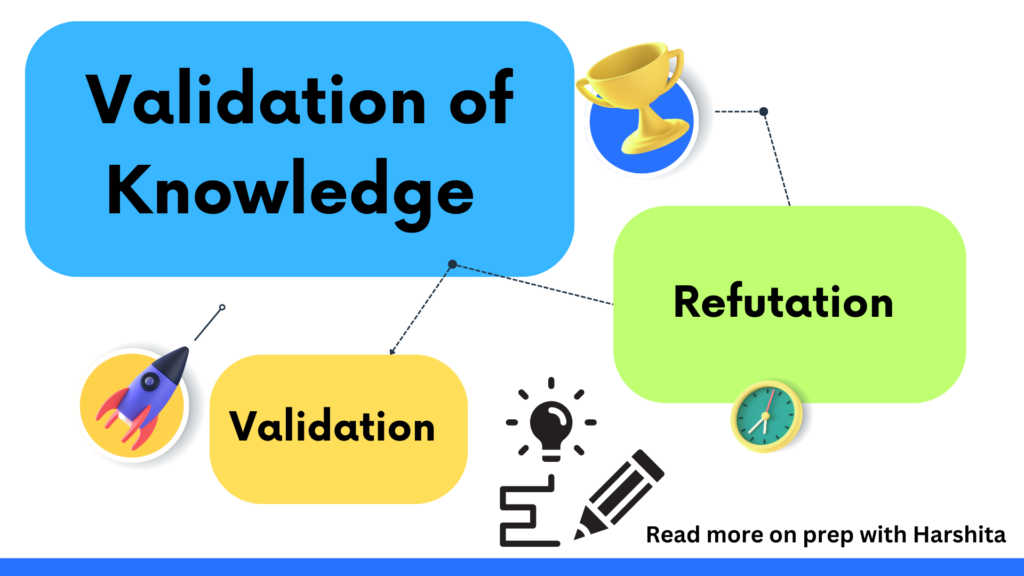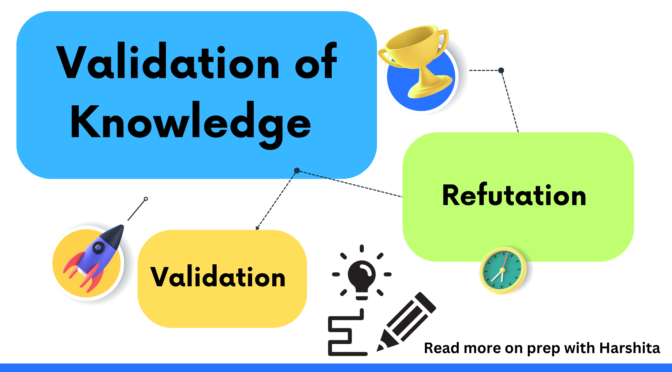Validation of knowledge refers to the process of assessing the reliability, accuracy, and credibility of information or beliefs. It involves critically evaluating the sources, evidence, and reasoning behind a claim or piece of knowledge.
There are several ways to validate knowledge, and here are some common methods in detail:
- Validation of Knowledge Verification: This refers to the process of assessing the reliability, accuracy, and credibility of knowledge or information. It involves various methods and criteria to determine the validity of a claim. Some key approaches for knowledge verification include:
a. Empirical Verification: This involves gathering empirical evidence through direct observation, experimentation, or data collection. It aims to test hypotheses or claims against real-world observations. For example, in scientific research, experiments are designed to validate or invalidate hypotheses by collecting and analyzing empirical data.
b. Logical Reasoning: Logical reasoning involves examining the coherence and consistency of the evidence and reasoning behind a claim. It assesses whether the premises logically lead to conclusions. Logical fallacies or inconsistencies in reasoning can indicate weaknesses in the knowledge.
c. Peer Review: Peer review is a critical process in academic and scientific research. It involves subjecting research papers, studies, or scholarly articles to evaluation by independent experts in the relevant field. Peer reviewers assess the methodology, data analysis, and conclusions to ensure they meet rigorous standards and contribute to the existing body of knowledge.
d. Cross-referencing and Corroboration: Cross-referencing involves comparing information from multiple independent sources to verify its consistency and accuracy. If different reputable sources converge on the same knowledge or claim, it increases confidence in its validity. Corroborating evidence from different sources strengthens the overall credibility of the knowledge.
e. Expert Consensus: Expert consensus refers to the collective agreement or endorsement of a particular body of knowledge by a community of experts in a specific field. It is established through rigorous debate, analysis of evidence, and extensive peer review. Expert consensus signifies the accumulated knowledge and expertise of qualified professionals, adding credibility to the knowledge. - Confirmability: Confirmability is a concept primarily used in qualitative research and is concerned with the objectivity and transparency of the research process. It focuses on establishing the trustworthiness and dependability of the findings. Key aspects of confirmability include:
a. Auditability: Auditability refers to the ability to trace the research process, including data collection, analysis, and interpretation. Detailed documentation and records are maintained to ensure that the research can be reviewed and verified by independent researchers.
b. Data Triangulation: Data triangulation involves using multiple sources, methods, or perspectives to collect and analyze data. By drawing on diverse data sources or employing different analytical techniques, researchers can enhance the reliability and confirmability of their findings.
c. Reflexivity: Reflexivity involves acknowledging and addressing the potential biases and preconceptions of the researchers that may influence the research process and findings. Researchers reflect on their own assumptions and values to minimize bias and enhance the objectivity of the research.
d. Peer Debriefing: Peer debriefing involves seeking feedback from colleagues or experts in the field to validate the research process and findings. These external perspectives help ensure the credibility and confirmability of the research. - Refutation: Refutation involves challenging or disproving a claim or knowledge by presenting counter-evidence, logical inconsistencies, or alternative explanations. It is an essential component of critical thinking, scientific inquiry, and scholarly debate.
The process of refutation involves:
a. Critical Analysis: Refutation requires a critical analysis of the evidence, reasoning, and assumptions behind a claim. This involves identifying weaknesses, errors, or gaps in the argument or evidence provided.
b. Counter-Evidence: Presenting counter-evidence that contradicts or undermines the original claim is a common approach in refutation. The counter-evidence should be based on reliable data and logical reasoning.
c. Logical Fallacies: Refutation often involves identifying logical fallacies in the reasoning behind a claim. Common fallacies include circular reasoning, false analogies, and ad hominem attacks. Identifying these fallacies helps expose flaws in the argument.
d. Alternative Explanations: Refutation can also involve presenting alternative explanations or hypotheses that better account for the available evidence. By proposing alternative perspectives, researchers aim to demonstrate that the original claim is less plausible or convincing.
Overall, the validation of knowledge verification, confirmability, and refutation are critical processes for establishing the reliability, credibility, and accuracy of information or beliefs. They involve rigorous evaluation, critical thinking, and the integration of multiple perspectives to ensure that knowledge is well-founded and trustworthy.
Also Read: Sources of Knowledge

Also Visit: Prep with Harshita


Unlimited Top-notch USA Private Proxies – 100 Anonymity and also Quickest Velocity – Acquire Proxies At this moment upon https://DreamProxies.com
One thing I would like to discuss is that fat burning plan fast can be performed by the correct diet and exercise. A person’s size not just affects appearance, but also the overall quality of life. Self-esteem, melancholy, health risks, and also physical abilities are damaged in putting on weight. It is possible to just make everything right and still gain. If this happens, a medical problem may be the reason. While a lot food but not enough work out are usually accountable, common medical ailments and key prescriptions may greatly help to increase size. Thanks for your post in this article.
Someone necessarily help to make significantly posts I might state. That is the very first time I frequented your web page and thus far? I surprised with the research you made to make this actual post amazing. Excellent process!
Thanks for the suggestions you have discussed here. Furthermore, I believe usually there are some factors which keep your auto insurance premium down. One is, to consider buying automobiles that are inside good set of car insurance providers. Cars which are expensive are usually more at risk of being snatched. Aside from that insurance coverage is also depending on the value of your automobile, so the higher in price it is, then the higher the particular premium you pay.
Download APK on Android with Free Online APK Downloader – APKPure Penalty Shooters Download Penalty Shootout – Kick to Win now and start your journey to becoming a soccer legend! Avant de pouvoir commencer à tirer les penalties, il faut définir le montant à miser. Pour ce faire, il faut utiliser le bouton situé en bas à gauche du ballon. Pour ce faire, il est possible de cliquer sur la case dédiée au montant à miser et de choisir ce dernier en faisant glisser le curseur. L’autre stratégie est l’inverse de la première. Il s’agit de prendre plus de risque en tentant d’aller jusqu’au bout du jeu, mais en ne misant que des sommes modestes. Ainsi, en misant 2 euros, si le joueur atteint le dernier multiplicateur, il remporte 64 euros. Utilisez votre souris pour verrouiller la cible et donner un coup de pied !
https://dev.cofmos.lt/revivez-ladrenaline-du-penalty-shoot-out-devoplay-un-coup-doeil-detaille/
Dans Penalty Shoot Out, vous devrez montrer votre habileté et votre chance. Pour gagner, il est important que les joueurs marquent des pénalités et battent le gardien de but. Rejoignez Penalty-Shoot-Out, choisissez votre pays favori, pariez et concourez pour le prix. Plongez dans PenaltyShootOut et goûtez à la victoire à chaque tir réussi ! Prenez-vous plaisir à jouer au football? Etes-vous connu comme un adversaire redoutable sur le terrain? Peut-être êtes-vous un partisan dévoué de votre équipe de football préférée. Quoi qu’il en soit, le jeu Penalty Shoot Out captivera à coup sûr à la fois les amateurs de sport et ceux qui ne sont pas aussi passionnés par… Vous pouvez également lire toutes les règles principales ci-dessous:
Um dos recursos inovadores do JetX é o seu layout moderno, mesmo com gráficos 2D o design do foguete indo para o espaço é muito atrativo, e a banda sonora 8-bit aumenta o entusiasmo ao jogar o jogo. Descubra como jogar o jogo JetX em 2025, um sucesso nos melhores cassinos online do Brasil. Com uma dinâmica simples e emocionante, o objetivo é retirar a aposta antes que o jato exploda. Por isso, procurei alguns dos melhores cassinos online do momento para realizar as apostas em Jetx. Para tal, levei alguns pontos em consideração. O primeiro deles foi segurança e confiança. Através da verificação de suas licenças e tecnologias para proteger os dados de seus clientes, consegui encontrar algumas boas opções. Para jogar Jetx você precisa conferir antes se a conexão de internet está estável, pois esse jogo exige reações imediatas.
https://bright-solutions-pannel-cleaning.oceanpromarketing.com/review-do-plinko-da-bgaming-um-classico-reinventado-com-graficos-realistas/
Esse cassino chama atenção devido a sua enorme variedade de código bônus Pin Up JetiX e promoções, para solicitar um bônus Pin Up, é necessário ativá-lo antes de fazer um depósito, você pode fazer isso na seção “Promoções” ou até mesmo na seção “Depósito”. Conheça os principais bônus que você pode obter: Apenas os administradores do grupo poderão mandar mensagens e saber quem são os integrantes da comunidade. Dessa forma, evitamos qualquer tipo de interação indevida. Sugestão de pauta enviar no e-mail:folhadoprogresso.jornal@gmail. Este artigo irá explorar a vasta gama de promoções e bónus oferecidos na Pin-Up, bastante como os Termos e Condições associados. Quer se trate de cash back semanal, presentes de aniversário, vantagens VERY IMPORTANT PERSONEL, rodadas grátis, Bónus de apostas múltiplas ou ultra money back em e-sports. Pin Up Casino pin up é uma grande plataforma em nosso país que oferece serviços sobre jogos no mais alto nível. Esta é uma record de alta qualidade que une uma grande quantidade de usuários la cual adoram jogar no cassino.
Fuksiarz to legalna strona bukmacherska, która ma specjalne zezwolenie, potwierdzające, że ten bukmacher prowadzi legalną działalność na terenie naszego kraju i płaci podatki. Wielkim zainteresowaniem cieszą się także freebety gry karciane – pokera, wojnę i actually bakarata. Specjalne tymczasowe i okazjonalne bonusy bez depozytu na karty udostępniają swoim klientom między innymi STS, forBET, Éxito i BETFAN. My chcielibyśmy w pierwszej kolejności wyróżnić “pewne 20 zł em BETGAMES w STS”. Jest to added bonus bez ryzyka, watts którym obrót nie jest wymagany i zwrot przyznawany jest na saldo depozytowe. aviator game online: aviator betting game – play aviator estrela bet aviator: aviator jogo – jogar aviator online Best Free Betting Tips
https://opendata.liberec.cz/user/wamochhornseed1989
Most other fees can be sidestepped by simply choosing a broker that doesn’t charge them, or by opting out of services that cost extra. Common fees to watch out for include annual fees, inactivity fees, trading platform subscriptions and extra charges for research or data. You can still earn over 4% on uninvested cash in your brokerage account. But to do so, you have to choose a broker with a high cash sweep rate, like those listed here. What’s more, your Aviator account syncs effortlessly across devices, allowing you to switch between pc and mobile without losing your progress or settings. While it’s important to remember that this doesn’t mean you’ll win every time a person play, it does suggest that the odds are more favorable. Playing games with a higher RTP like Aviator could be a wiser choice for these looking to have a much better chance regarding seeing a positive return about their bets.